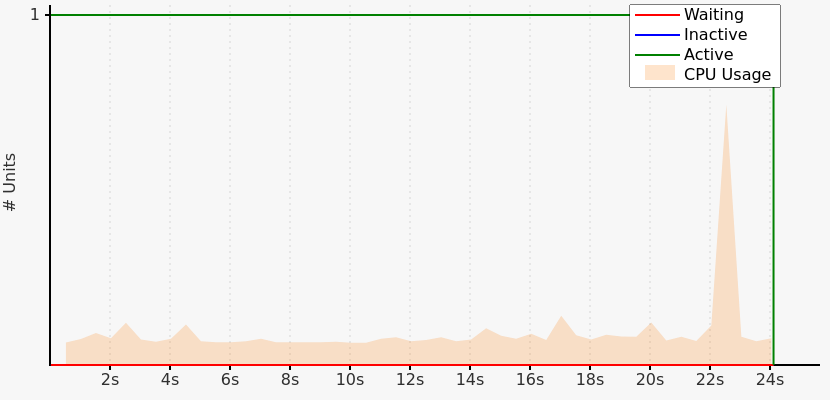Improving Compile Duration
To measure the compile duration in cargo, we will run cargo with the timings flag:
cargo build --timings
This will give some more details on what package takes how long. In addition, we will use the following commands to set up our project:
cargo new --bin test-compile-duration
cd test-compile-duration
cargo add --git https://github.com/robert-oleynik/tf-bindgen tf-bindgen
cargo add --git https://github.com/robert-oleynik/tf-kubernetes
We will use the tf-kubernetes provider because it is known for having long compile times. To finalize our preparations, we will add the following source code to our src/main.rs:
use tf_kubernetes::kubernetes::Kubernetes;
use tf_bindgen::Stack;
fn main() {
let stack = Stack::new("compile-time");
Kubernetes::create(&stack).build();
}
To start our tests, we will run cargo build --timings to receive an initial measurement for our repository. The following tables contain the result of this run:
| Unit | Total | Codegen |
|---|---|---|
| tf-kubernetes v0.1.0 | 160.4s | 110.3s (69%) |
| test-compile-time v0.1.0 bin "test-compile-time" | 24.7s | |
| tf-kubernetes v0.1.0 build script (run) | 5.4s | |
| Total | 206.3s |
Although tf-kubernetes has the longest compile time, we will focus on test-compile-time, because of incremental builds we only have to compile tf-kubernetes once. The following diagram contains the CPU usage for only the compilation test-compile-time:

Because our program is simple and short, we know most of this time is due to linking our executable. In addition, we can see that our linker is only using a single CPU core most of the time.
Using mold as a linker
As stated on their GitHub page, “mold is a faster drop-in replacement for existing Unix linkers. […] mold aims to enhance developer productivity by minimizing build, particularly in rapid debug-edit-rebuild cycles”. This matches our needs, so we will set mold as our linker in this section.
We will start with replacing our current linker with mold by adding .cargo/config.toml to our project:
# .cargo/config.toml
[target.x86_64-unknown-linux-gnu]
linker = "clang"
rustflags = ["-C", "link-arg=-fuse-ld=/usr/bin/mold"]
Now we can rerun our test using the following commands:
cargo clean # ensure same test conditions
cargo build --timings
While our total compile only drops by about 12%, the duration of building test-compile-time will be reduced by about 84%.
| Unit | Total | Codegen |
|---|---|---|
| tf-kubernetes v0.1.0 | 159.9s | 111.0s (69%) |
| test-compile-time v0.1.0 bin "test-compile-time" | 3.9s | |
| tf-kubernetes v0.1.0 build script (run) | 2.9s | |
| Total | 180.37s |
Using LLVM lld as a linker
While using mold gives you impressive performance, LLVM lld can reach the same level of in our case.
You can enable lld as your linker by setting your .cargo/config.toml to the following code:
# .cargo/config.toml
[target.x86_64-unknown-linux-gnu]
linker = "clang"
We will run the same commands as used with mold:
cargo clean # ensure same test conditions
cargo build --timings
The results show that we can see the same improvement in compile duration as with mold:
| Unit | Total | Codegen |
|---|---|---|
| tf-kubernetes v0.1.0 | 160.4s | 111.3s (69%) |
| test-compile-time v0.1.0 bin "test-compile-time" | 4.0s | |
| tf-kubernetes v0.1.0 build script (run) | 2.9s | |
| Total | 180.7s |